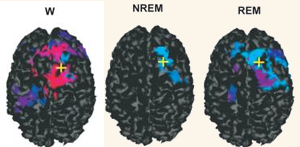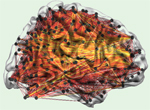Monday, 13 June 2016
Conscious Awareness and Integration of Brain Activity: They Go Together

Sometimes the complementarity between certain scientific experiments may not actually prove anything but still points in a fairly obvious direction. And that is the case with a study that was brought to my attention by a reader of this blog (thanks, Pascal R.!) after I published two posts recently on studies of the type of neuronal activity associated with conscious awareness. Before I summarize the study that Pascal told me about, let me remind you about the findings of the two other studies. (more…)
The Emergence of Consciousness | Comments Closed
Tuesday, 10 May 2016
Dynamics of complex networks sheds light on loss of consciousness associated with sleep
 When I read the abstract of the article “Hierarchical clustering of brain activity during human nonrapid eye movement sleep” published by Dr Habib Benali and his team in the April 2012 issue of the journal Proceedings of the National Academy of Sciences of the United States of America (PNAS), I quickly realized that the phenomenon that these authors had observed was pretty much the opposite of the one observed in a study by Douglass Godwin and his team: the temporary breakdown of the brain’s functional networks when an individual becomes aware of a stimulus. (more…)
When I read the abstract of the article “Hierarchical clustering of brain activity during human nonrapid eye movement sleep” published by Dr Habib Benali and his team in the April 2012 issue of the journal Proceedings of the National Academy of Sciences of the United States of America (PNAS), I quickly realized that the phenomenon that these authors had observed was pretty much the opposite of the one observed in a study by Douglass Godwin and his team: the temporary breakdown of the brain’s functional networks when an individual becomes aware of a stimulus. (more…)
Sleep and Dreams | Comments Closed
Thursday, 7 April 2016
Your Personal Identity: An Illusion That Hides A Work in Progress?
 Fascinated by a web page of photos taken with the same family members in the same poses at the same location two or three decades apart (see first link below), I recently suggested to my family that we try the same thing. We took photos of ourselves in the same postures and in the same kitchen as in some old photos that I had from quite a while back. We didn’t go so far as to try to wear clothing similar to what we were wearing in the older photos, but seeing ourselves in such similar situations several decades apart still raised some disturbing questions about the very notion of a personal identity. (more…)
Fascinated by a web page of photos taken with the same family members in the same poses at the same location two or three decades apart (see first link below), I recently suggested to my family that we try the same thing. We took photos of ourselves in the same postures and in the same kitchen as in some old photos that I had from quite a while back. We didn’t go so far as to try to wear clothing similar to what we were wearing in the older photos, but seeing ourselves in such similar situations several decades apart still raised some disturbing questions about the very notion of a personal identity. (more…)
The Emergence of Consciousness | Comments Closed
Monday, 21 March 2016
Awareness as a Temporary Breakdown of the Brain’s Functional Networks

When you become consciously aware of something, what exactly is happening in your brain? Or stated differently, is there a geography of neuronal connections that is specific to becoming aware of a stimulus (for instance, a stimulus that is presented very briefly, so that you may or may not become aware of it)?
This is not a new question. It amounts to asking whether there are particular brain networks that are essential to awareness, or whether awareness instead emerges from the connectivity of large areas of our sensory and associative cortexes. This latter, global approach received support from a study published in March 2015 in the Proceedings of the National Academy of Sciences of the United States of America, entitled “Breakdown of the brain’s functional network modularity with awareness”, by Douglass Godwin and two collaborators. (more…)
The Emergence of Consciousness | Comments Closed
Monday, 29 February 2016
When Advertisements Steal Our Attention

A New York Times article by Matthew B. Crawford, entitled “The Cost of Paying Attention” (first link below) analyzes the way that the public space is being invaded by advertising. First, he points out that attention is a limited cognitive resource. He shows how private businesses are waging a veritable war to appropriate our “private head space” with advertising messages, thus making it harder and harder for us to resist these constant, alienating “bottom-up” stimuli and exercise “top-down” control over our own thoughts. In this process, says Crawford, we are losing something vital: “Just as clean air makes it possible to breathe, silence makes it possible to think.” (more…)
The Emergence of Consciousness | Comments Closed







